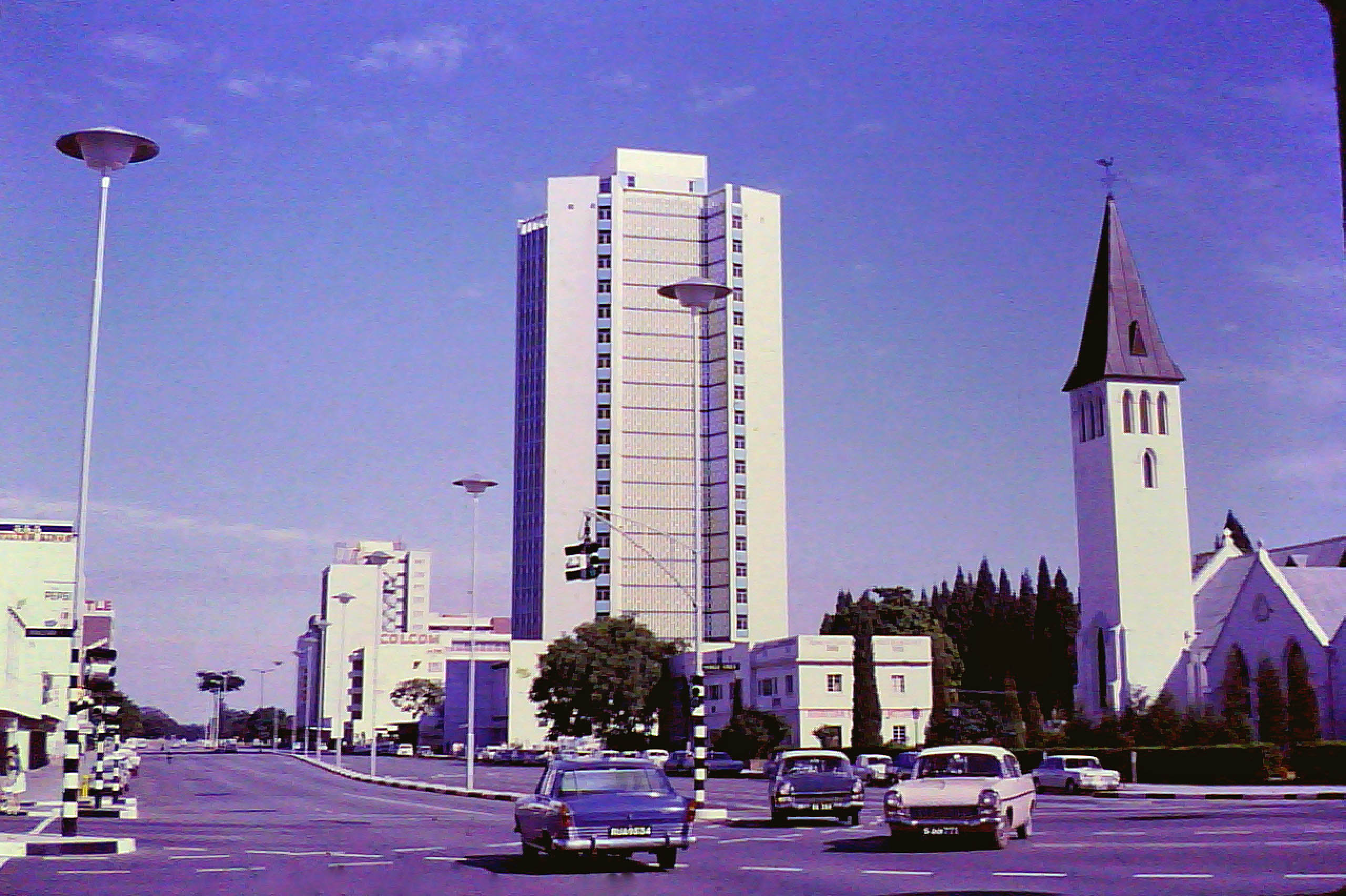Reading List: Brooks Marmon
The writings of Edson Sithole, Zimbabwe’s forgotten nationalist thinker, reveal both the promise and perils of pan-African politics in the independence era.

Jameson Ave. (now Samora Machel Ave.) in Salisbury (now Harare, Zimbabwe) in the 1970s. Image credit Rob Atherton via Wikimedia Commons CC BY 2.0
For prominent Zimbabwean legal minds seeking to dismantle white domination in their homeland, 1975 was a trying year. The renegade British colony’s first black lawyer, Herbert Chitepo, who led the Zimbabwe African National Union (ZANU) from exile, was killed in a car bomb in Lusaka in March. In October, ZANU’s former publicity secretary, Edson Sithole, one of the most prominent nationalists who had not gone abroad, disappeared after leaving a well-known hotel in downtown Harare (then Salisbury).
Sithole, a self-made legal scholar with a Doctor of Law degree from the University of South Africa, was born in rural Southern Rhodesia to illiterate parents in 1935. Regrettably, his political thought and actual contributions to Zimbabwe’s liberation struggle have been subsumed by the unexplained nature of his demise (agents reporting to Rhodesian Prime Minister Ian Smith were believed to be responsible).
A forthcoming book I’ve compiled for the Voices of Liberation series of South Africa’s HSRC Press serves up a political biography of Sithole (written by me), accompanied by the full reproduction of some two dozen writings and speeches by Sithole from the late 1950s until days before his elimination. Tinashe Mushakavanhu’s contribution to this series on ZANU’s founding leader, Ndabaningi Sithole (a distant relative), crystallized the idea for this manuscript.
As a PhD student researching the politics of decolonization in colonial Zimbabwe in the 1950s and 1960s, I was acutely aware of the standard historiographical lament: that the continent’s independence-era stalwarts left behind a limited archive. Although the personal papers of their white settler counterparts are disproportionately preserved, the example of figures such as Sithole leads me to believe that this claim is overstated.
As the Voices of Liberation and AIAC’s own Revolutionary Papers series demonstrate, a significant cohort of pan-African, anti-colonial nationalists embraced the power of the pen to assail colonialism.
During my doctoral studies, a thorough review of the African Daily News, a newspaper targeting a predominantly black readership, revealed that Sithole frequently contributed op-eds on political developments not only in Rhodesia, but across the continent. Like many similar periodicals, it has not been digitized. Thus, not only are his words out of circulation, but the research to recover them is a painstaking process. These essays form the bulk of Sithole’s voice in the forthcoming book.
Sithole was among a coterie of young turks contributing a stream of opinion pieces in this paper that have gone underacknowledged in the historiography. However, I was particularly drawn to his voice. A notable strand of my thesis, Pan-Africanism Versus Partnership (now published in book form), argued that the era’s emphasis on pan-Africanism sowed the seeds of authoritarianism, promoting absolute unity at almost any cost.
Sithole stood out as an exception. In 1961, Zimbabwe’s nationalist movement, under the direction of Joshua Nkomo, initially agreed to British-mediated constitutional reforms that preserved minority white rule. In African Daily News think pieces, such as “Nkomo was Tricked by Britain, but We Cannot Accept Clumsy Explanations to the People,” Sithole went against the dominant tenor of the struggle to denounce Nkomo’s prevarications.
Initially a rather solitary voice, Sithole’s condemnations of Nkomo gathered momentum, leading Ndabaningi Sithole to oversee the launch of ZANU, which provided a viable challenge against Nkomo. Sithole celebrated that development in a 1963 op-ed entitled, “Nkomo’s Sun is Setting.”
Sithole also critiqued African statesmen who he felt betrayed the nationalist cause. Nigerian Prime Minister, Abubakara Tafawa Balewa, who flirted with the white settlers of Southern Africa more than has generally been acknowledged, was another target. Sithole’s “The Role of Nigeria in Africa’s Struggle” displays an impressive knowledge of Nigerian domestic politics in a pre-digital age and a courageous willingness to call out the leader of one of Africa’s most powerful states.
When Ian Smith came to power in 1964, white rule in Rhodesia became even more repressive. Sithole was jailed, his party (ZANU) was outlawed, and the African Daily News was banned. References to African nationalist politicians in the local press became verboten.
In the early 1970s, Sithole emerged from several years of imprisonment to become the publicity secretary of another liberation movement, the African National Council. With his law practice thriving and party duties consuming much of his time, his for-attribution writings decreased.
However, an assortment of interviews and other materials, complimented by the emergence of an ANC-aligned newspaper in 1975, The National Observer, ensures that Sithole’s voice can be tracked into the 1970s. The Observer, a poorly preserved periodical, published what was likely Sithole’s last opinion piece, “How We Formed the ANC,” just four days before his disappearance. It continued his long-running criticisms of Nkomo and countered his nemesis’s framing of the liberation struggle’s trajectory.
Still, I felt like something was missing to tie together the various elements of Sithole’s discourse. In taking a leadership role in the ANC, seen as a more conciliatory party due to the presence of comparatively restrained intellectual voices and ecumenical figures in its leadership, Sithole appeared to have backtracked on his prior revolutionary zeal. Then, on a trip to the UK National Archives, I found the transcript of a 1973 address by Sithole, “Where Now, Rhodesia?”
The remarks were delivered to the Rhodesia National Affairs Association, a white dominated civil affairs society, just as the armed struggle heated up. They indicate a pragmatic attempt to avert the explosion of bloodshed that marked the second half of the decade in Rhodesia. That tumult cost Sithole his life, and its legacy continues to plague Zimbabwe today.
I hope that this recovery of Sithole’s political thought not only recognizes his intellectual role in African independence struggles, but also illuminates the repercussions of intransigence by powerful elites who seek to maintain their dominance.



